These are the current pay scales for GP trainees in effect from April 2025 onwards. As the new junior doctor contract has been implemented in England pay scales are now very different in England compared to Wales, Scotland and Northern Ireland. In this article, Dr Mahibur Rahman looks at the current pay scales for both new and old contracts, as well as an estimate of your net pay when in GP practice based posts.
GP Training Pay Scales – New Junior Doctor Contract (England only)
The new contract bases pay on your stage in training: ST1, ST2 or ST3. For hospital posts, the old banding system has been replaced by a complex calculation of pay for hospital jobs which depends on multiple factors including the average number of hours worked per week, number of on calls, frequency of nights, weekend working etc. At the bottom end, some ST1 / ST2 posts with 40 hours per week, no on call commitments, no weekend or night working will have basic pay only of £43,923 per year (e.g. some public health posts). At the top end, a busy post in emergency medicine with 1 in 3 weekends, an average of 47 hours per week worked and with lots of regular night shifts might give a total package of over £55,000 per year.
For posts within a GP practice (when you are designated a GP registrar), there is a fixed additional payment which is £9,693 for the current year pro rata (e.g. if you do 6 months in a GP practice you get half this amount). This allowance is NOT payable when in hospital posts as part of your GP rotation. For GP plus / integrated training posts where you spend part of the week in GP and part of the week in hospital / a different specialty, there is variablity by employer – in some cases you will get half the GP premium, in some cases you won’t get the GP premium.
If you are training in London, there is an additional London weighting allowance of between £2,162 and £3,461 per year depending on where in London you are working.
If you are training less than full time (LTFT), there is an allowance of £1,000 per year.
There is no increase in basic pay between ST1 and ST2 in England.
GP Trainee Pay scales – Scotland, Northern Ireland and Wales (old contract – figures shown for Scotland, there are slight variations for NI / Wales)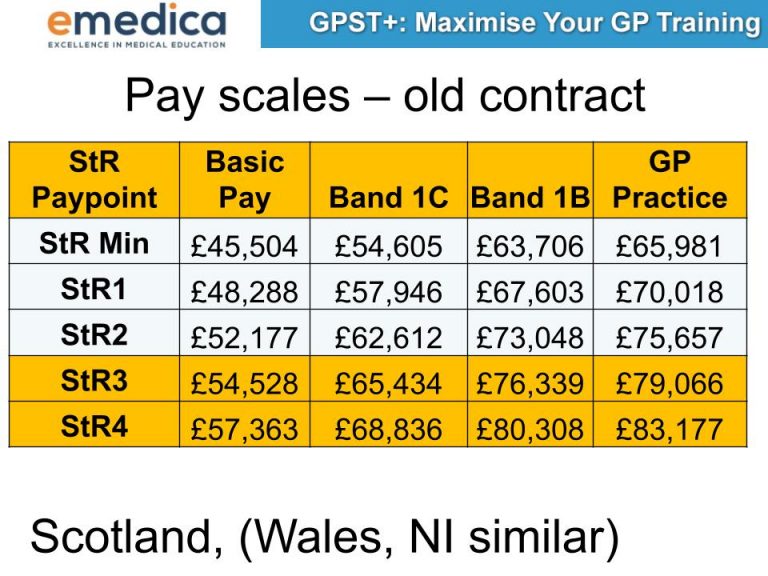
For hospital posts, total pay will depend on the banding (jobs with more on call / antisocial hours carry a higher supplement). Only the most common bands are shown here – some posts may have higher banding payments (Band 1A/2B/2A). The GP Registrar supplement is currently fixed at 45% – this is for all posts when based in a practice, regardless of the year of training, or the number of on call or out of hours shifts completed.
If you are entering GP training from another training post in Scotland, Wales, or Northern Ireland, you should start on the paypoint with basic pay that is closest to your current basic pay. E.g. if your current basic is £44,900, you will move onto the StR Min scale, with a basic pay of £45,504 and so on. You will move onto the next point on the scale on the anniversary of your increment date (this should be on your last payslip).
When you are on paypoint StR3 or higher (shown in orange above), you are entitled to an extra 5 days of annual leave – so you will get 32 days instead of 27 in addition to bank holidays. Please note that StR3 is NOT the same as being in your ST3 year. The paypoint is based on past NHS experience, NOT your year of training. For example, a doctor entering GP training straight from Foundation Year 2 will go onto the StrMin payscale during their ST1 year, then StR1 in their ST2 year, and StR2 in their ST3 year. They will have 27 days annual leave in all 3 years of the rotation. A doctor entering GP training having already completed 2 years of core medical training would start on the StR2 payscale (while in the ST1 year). They would have 27 days leave in this year. In the ST2 year, they would be on the StR3 payscale and get an additional 5 days leave, and so on. There may be slight variations to these payscales between Scotland, Northern Ireland and Wales (a few hundred pounds a year) as annual pay increases are devolved matters.
GP Registrar Salary – Net Monthly Pay – new contract (England only)
Most GP rotations now have 24 months in general practice – a few areas still have 18-20 months in GP, with the remainder in hospital. As there are a lot of costs during the latter part of your GP training, we thought it would be helpful to look at estimated NET pay (i.e. take home pay after Tax, National insurance, and NHS pension). This might help you plan and budget so you can meet the costs of sitting the MRCGP AKT Exam and MRCGP SCA Exam (about £1,600 together) as well as other final year costs such as CCT, indemnity when you qualify as a GP etc.
GP Registrar Salary – Net Monthly Pay (old contract) – Figures shown are for Scotland – Northern Ireland / Wales have slight variations and are currently slightly lower than the figures shown
*These figures are estimated monthly take home pay net of income tax, national insurance and NHS pension. They have been rounded to the nearest pound, and are based on a standard tax code. They do not include deductions for student loans. As your pay may change during the tax year, the actual amount may differ. You can get an accurate monthly calculation here (external link).
Total pay (and therefore net pay) in hospital rotations is very variable, depending on hours worked / unsocial hours / on-calls etc. and take home pay can therefore vary from as little as ~£2,700 a month to over £3,800+ a month for hospital posts in ST1 for doctors.
Pay protection
If you are entering GP training from a training post in a different specialty, or from a non training post in a nationally recognised career grade post (e.g. consultant, specialty doctor, staff grade), then in some cases you may be entitled to pay protection of your basic pay subject to strict eligibility criteria (e.g. at least 13 months continuos service, not working in a locum post etc.).
Career grade doctors moving from a local grade (e.g. trust grade, trust registrar, clinical fellow) do NOT get pay protection. Pay protection in the new contract is very complex – you can read an overview here, however I would recommend you contact the BMA for individual advice of your eligibility as in some cases you may be able to get some recognition of past experience on a case by case basis even if standard pay protection does not apply to you.
——————————————————————————————————————–
If you are starting GP training soon, or are in ST1, then our GPST+: Maximise Your GP Training course will help you succeed in all 3 years of training – it covers contracts, pay, expenses, how to increase your take-home pay, as well as tips to help you avoid complaints, useful courses and qualification to do during training, how to pass your MRCGP AKT, CSA/SCA, the assessments and requirements for workplace based assessment in ST1 / ST2 / ST3 (including recent changes to the e-portfolio and assessments), how to write SMART PDPs for each rotation, how to get through ARCP, and more!
If you found this article helpful, please do share it with your colleagues! For regular updates and discussion on topics related to GP training, join our GP Training Support Facebook group:




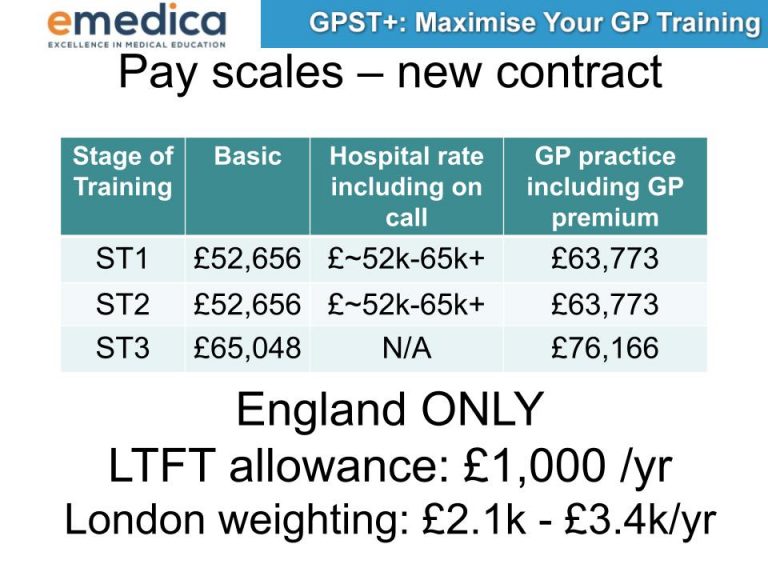
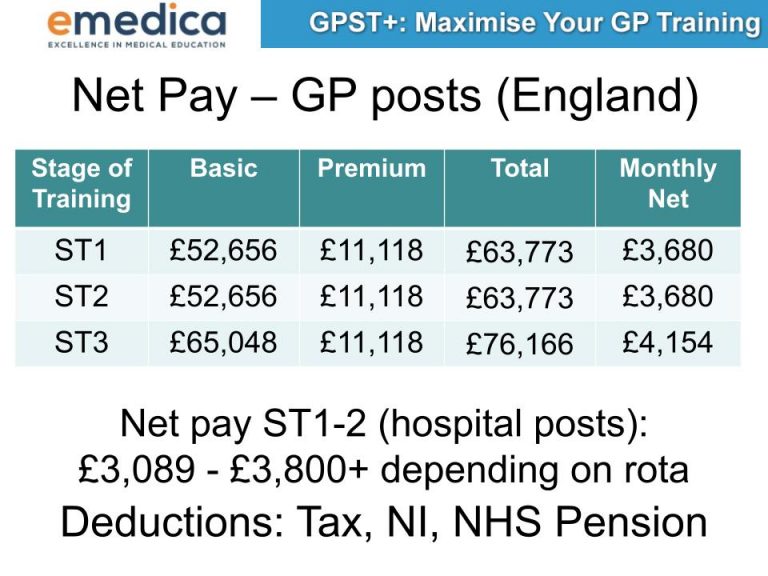
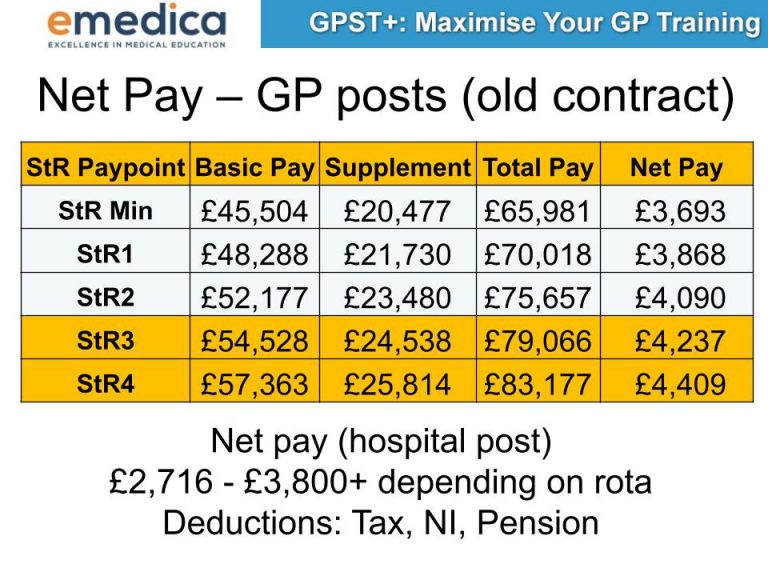
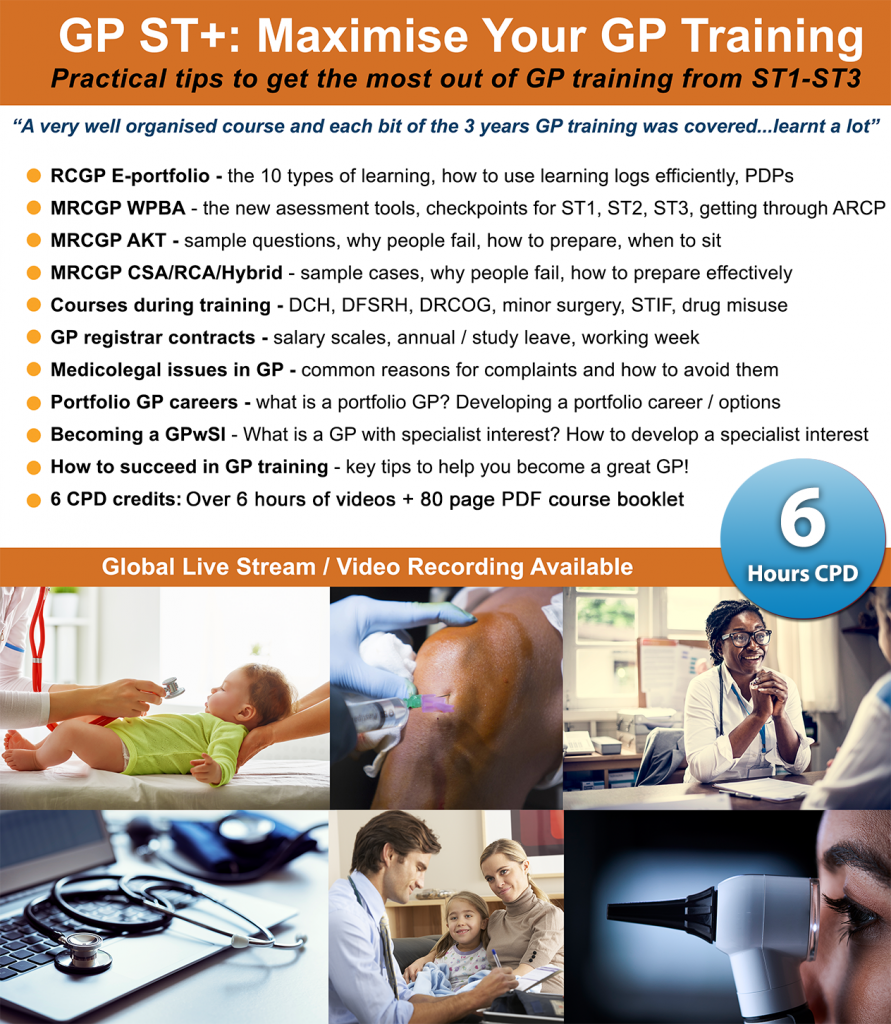

You must be logged in to post a comment.